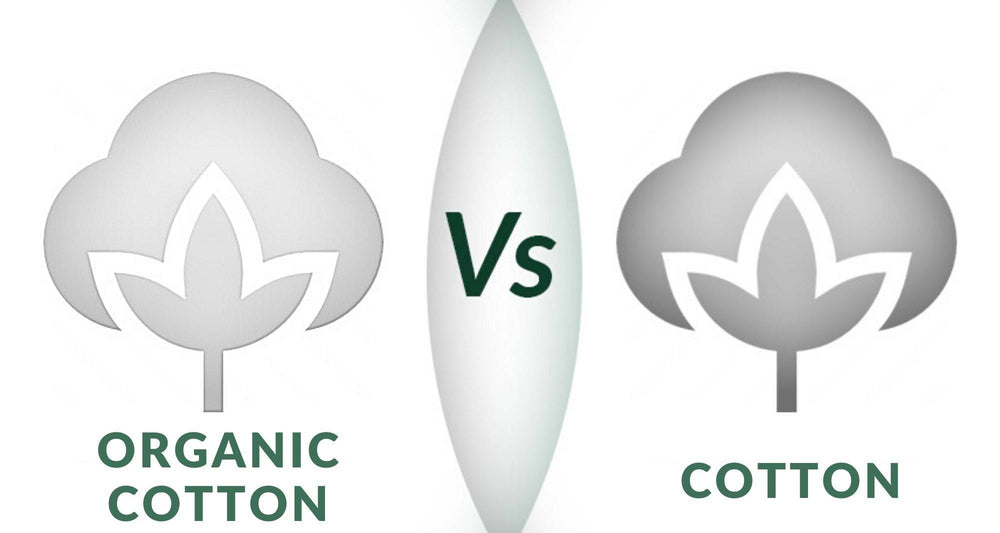
Organic Cotton vs Cotton: What's the Difference?
|
If you're not happy with your first pair of underwear after trying it on, let us know.
We'll send a new size or color, or give you a refund. No returns needed.

Katie Lemon
|
Cotton is the most commonly used fabric on earth, accounting for over half of the world’s fiber needs. I bet you’re wearing something made of cotton as you read this. But did you know that when it comes to organic cotton vs cotton made the conventional way, there are stark differences between the two?
There’s a reason for using organic cotton in our fabric blends here at WAMA. While priding ourselves on using plenty of hemp, one of the world’s most sustainable fabrics, organic cotton is an important element in our uber-soft and durable underwear. So when you’re wearing our men’s boxer briefs or women’s thongs, you can be confident that you’re taking care of both yourself and the environment.
Organic cotton plays an important role in our super durable and extremely comfortable organic underwear styles. It lends a softness and breathability that only improves everything that hemp fiber brings to the table. So why use organic cotton vs regular cotton? Let’s break down the difference between the two.
It’s pretty simple: organic cotton is grown organically, meaning the cotton plants are not genetically modified, and no harmful pesticides or fertilizers are used in the process.
What is organic cotton good for? Well, it can be used for anything from clothing and coffee filters to bedding and curtains. Basically, you can use organic cotton instead of regular cotton in just about any instance.
In the comparison of organic cotton vs conventional cotton, organic cotton is better for you and I (and the environment!) for a few big reasons. Keep reading to learn the shocking truth about regular cotton, and what sets organic cotton apart.
Making a t-shirt from regular cotton takes 2,168 gallons of water. A t-shirt made from organic cotton uses just 186 gallons of water. This jaw-dropping figure from Textile Exchange isn’t the only impact of regular cotton vs organic cotton on water usage.
There are two main options to water cotton plants: by rainfall or irrigation.
According to Textile Exchange, 80% of organic cotton is watered using rainfall. Using rainfall means precious water sources don’t need to be diverted to cotton farming. On the other hand, the extensive irrigation used to grow most regular cotton depletes groundwater and creates harmful runoff due to the next item on this list.
Conventional cotton uses more than 25 percent of the pesticides used in farming around the world. These pesticides wreak havoc on the environment by entering the water through runoff. The water is soaked up by plants and ingested by wildlife, threatening biodiversity and the natural environment.
Pesticides are also terrible for humans, both those that come into contact with affected water and especially those that work with the substance directly. It’s called occupational pesticide exposure, and it’s been linked to:
When comparing organic cotton vs cotton in regards to pesticide use, organic cotton is eons better for the earth. Organic cotton farmers don’t use any pesticides. They use native insects that eat the smaller bugs threatening to destroy organic cotton, and the region remains biodiverse with a balance of insect life.
Growing organic cotton emits about 46 percent less CO2 than conventional cotton. This massive difference has important effects on the environment, as CO2 accounts for up to a quarter of the greenhouse gases destroying the earth’s ozone layer.
Organic cotton is able to reduce carbon emissions because organic farming requires crop rotation techniques that naturally sequester carbon and keep it from entering the atmosphere.
An added bonus? These organic farming techniques mean that organic cotton requires about 62 percent less energy overall to grow than conventional cotton. In the match of regular cotton vs organic cotton, organic is definitely the answer so far.
Organic cotton is handpicked, without the use of machinery, chemicals, or defoliants. Handpicking reduces waste in the farming process and is totally safe for workers. As an added bonus, handpicking allows for better protection of the cotton fibers.
On the other hand, the work environment within the conventional cotton industry is extremely harmful to workers for two reasons:
Regular cotton is picked with machinery and treated with toxic chemicals that can harm workers greatly (think back to occupational pesticide exposure and all the nasty side effects that come with it).
The conventional cotton industry has been linked to a heartbreaking trend of suicide amongst farmers. The tough competition and decreasing prices in the cotton industry are driving cotton workers to labor for long hours and still not achieve good profit. In India alone, more than 270,000 cotton farmers have committed suicide since 1995.
The difficulties cotton farmers face around the world is a startling reminder that the clothes that you and I buy are grown and made by people just like us. Wouldn’t you rather use goods made organically, without harming the environment or the humans producing them?
After it’s grown, cotton is treated with harmful chemicals that can wreak havoc on wearers—from rashes and itchiness in those with sensitive skin, to known carcinogens like formaldehyde that have been linked to cancer. Frequent guests to the conventional cotton-making party include harsh additives such as:
I take it back, that doesn’t sound like a party at all. Alternatively, organic cotton is hypoallergenic. Even if you don’t have sensitive skin, when choosing between organic cotton vs conventional cotton, stick to organic. Not only will you avoid the additives listed above, you also won’t have to deal with the pesticide residue that clings to cotton fibers and can also cause adverse skin reactions.
Handpicked cotton fibers make for something called “long staple cotton,” fibers that are longer and stronger than those picked with machines. Industrial cotton machinery is pretty rough with the raw fibers, often breaking and weakening them before they’re even processed into clothes.
The difference in quality between handpicked and machine-picked cotton is worlds apart. Where handpicked organic fibers are naturally soft to the touch while maintaining a strong fiber, machine-picked conventional cotton fibers are weaker, broken down from chemicals, and not nearly as soft to the touch or as reliable in durability. Invest in organic cotton and you’ll have clothing that will last far beyond the days of conventional cotton.
65 percent of fair trade cotton farmers are also certified organic, and that number is on the rise. While not all organic cotton is fair trade and vice versa, there’s a strong overlap between the two. Which makes sense, because organic fibers and fair trade practices are all about protecting people and the earth.
Looking for fair trade products is always a good idea. Fair trade goods are certifiably kinder to the environment because they maintain high standards for avoiding harsh chemicals and producing excessive waste. You can also feel good about fair trade organic cotton because you’ll know it was produced in a safe work environment that treated workers fairly.
Okay, so the answer is pretty obvious, but let’s review the facts:
Sure, when it comes to hemp vs cotton, hemp is more sustainable than even organic cotton. But for pretty clear reasons, I prefer organic cotton vs regular cotton. And so does WAMA, which is why we use organic cotton in all our fabric blends. So when you’re perusing everything from our trunks to our boy shorts, you know you’re doing the best thing for your own health, workers around the world, and the environment.
Now that you know the difference between organic and non-organic cotton, do you think you’ll change your buying habits? Do you already have some favorite organic cotton brands? Let me know in the comments.
Get updates on restocks, new color and size releases, and upcoming product launches. You’ll also get a 15% discount on your first order of hemp underwear.












